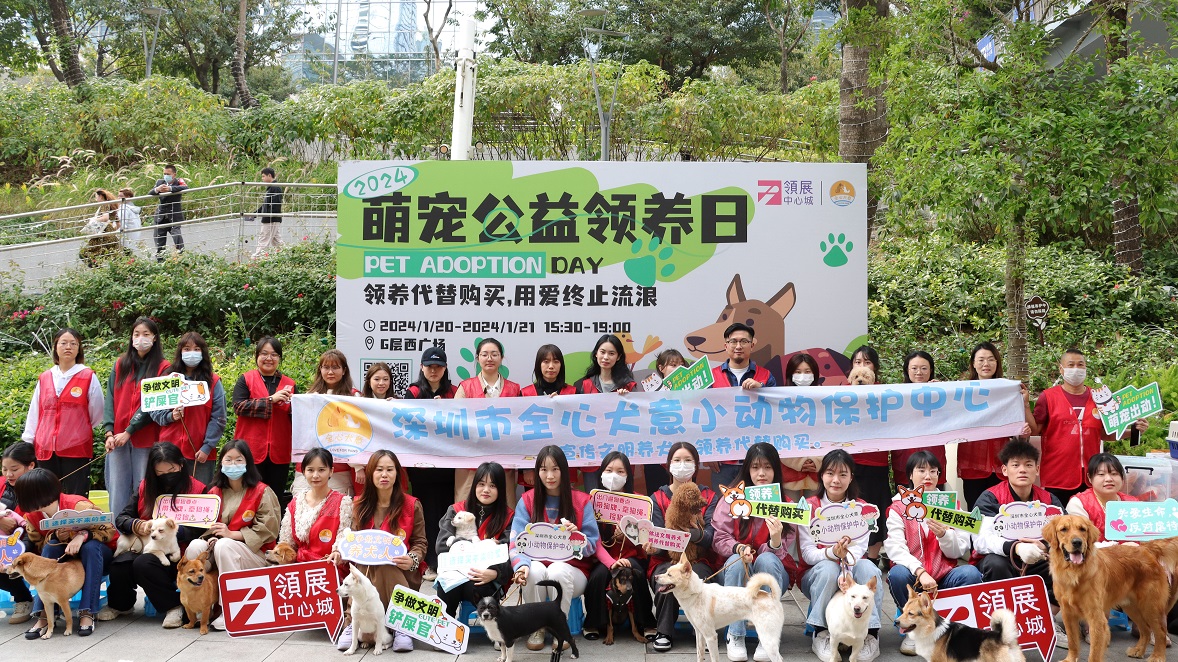
On a leisurely weekend afternoon at Link CentralWalk’s west plaza in Shenzhen, scores of dedicated volunteers identifiable by their vibrant red vests can be seen mingling with visitors, all of them cradling a menagerie of adorable puppies of diverse breeds. The air is filled with playful yelps and the joyful wagging of countless tails, and the puppies gaze expectantly at the visitors with their watery, apricot-shaped eyes, instantly endearing themselves and melting hearts. The visitors can’t resist returning their affection, patting the puppies’ fluffy heads and gleefully playing with them.
This bustling plaza is not a pet park. Instead, it serves as the site of a pet adoption day organised by Link in collaboration with Shenzhen’s Quan Xin Quan Yi small animal protection centre. Since November 2023, the organisation has set up weekend booths at Link CentralWalk’s open-air spaces, transforming it into a haven for visitors to get close to adorable four-pawed pals and for stray animals to find loving permanent homes.


Mi Qing, the passionate director of Quan Xin Quan Yi, shares that her centre has organised at least two offline adoption events per month since its inception in 2020, successfully rescuing more than 2,000 stray animals. When asked about the motivation behind setting up her organisation, Mi Qing said she was driven by the mission to promote “lawful, responsible dog ownership” through physical adoption events. Additionally, she aspires to shift public perception towards “adopting rather than buying” when it comes to welcoming small animals into their homes. The volunteers are also committed to educating the public about ethical pet ownership, emphasising the principles of “no abandonment, no breeding, no cruelty.”
“Many people look upon the rescue endeavour of stray cats and dogs as a losing battle, but we disagree. Every life is valuable, and every creature with feelings deserves respect,” says Mi Qing. “While one person’s contribution may appear limited, collective efforts can create a wave. By inspiring more people to join our compassionate team, we hope to address Shenzhen’s stray animal problem through adoption.”
Pet owners often find it challenging to take their furry companions out, owing to the multiple restrictions imposed by shopping malls regarding pet entry. Mi Qing acknowledges that the selection of a mall as a site for a pet adoption event might raise concerns among shoppers, making the choice of venue critical: “Shopping malls must offer adequate outdoor space for such events. Link CentralWalk, with its semi-open spaces and lush greenery, offers an ideal backdrop for stray animals to feel comfortable while interacting and playing with potential adopters.”

The growing popularity of pet ownership has prompted advocacy for pet-friendly policies by diverse communities to integrate pets into daily routines, such as allowing pet owners to bring their beloved pets to shopping malls. Mi Qing applauds this sentiment, noting: “The move towards inclusivity is evident, and shopping malls are becoming increasingly welcoming to pet owners. Outside of adoption events, some malls now allow pet owners to bring their well-behaved companions during everyday visits.”
For added convenience, she suggests that it would be ideal if more shopping malls set up dedicated pet-rest areas to give pet owners more space to enjoy without disturbing other customers. Some malls even offer clean-up amenities to address potential issues with pet waste.
“The continuous enhancement of amenities and services to support dog owners, along with the creation of large spaces for people-pet interaction, can enable shopping malls to promote ‘responsible pet ownership’ as a new trend and foster pet friendliness throughout the city.”


Besides providing a welcoming environment and adequate amenities, Mi Qing highlights the strategic advantage of urban malls for pet adoption: “Located in the heart of the city with easy access and heavy visitor traffic, these malls attract white-collar workers and families and increase the chance of stray animals finding their forever homes.”
Xiao Gao, who adopted a puppy at the event, agrees: “Adoption events in shopping malls make them easily accessible even by the metro. For pet lovers like us, it is definitely worth the special weekend trip.”
Mi Qing sees immense potential in shopping malls and wishes to organise additional adoption events in the future to bring hope to more stray lives. Besides facilitating adoptions, she envisions these spaces as platforms to promote the virtues of pet rescue and the “adopt, don’t shop” philosophy, making the caring for stray animals a natural part of everyday life.